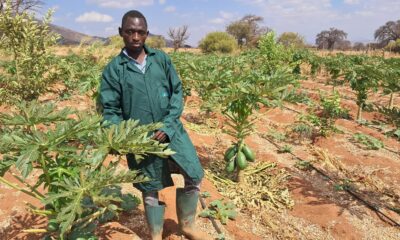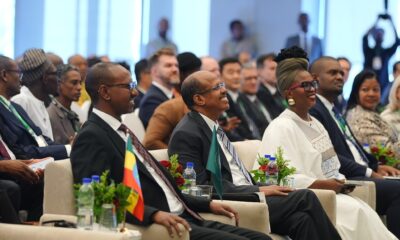National Issues
On Nigerian Unity. A monologue -By John Akinyode
Through such basic aspirations, I am persuaded that we are united as a human race. We bleed if our skin is pierced, our hearts pump blood, veins transport, organs regulate, cells absorb. So, the next time you throw a gaze on the next man or woman, just think about it. How do we differ? Skin color? Or like Bob Marley would say, the color of eyes? I am looking forward to that day, just like Bob Marley did. I look forward to that day.
Split you say? And you are from northern Nigeria? I can tell from your name and tribal marks. Right, you are a Kanuri. Perhaps you underestimate our predicament. You do not? Well, in any event, I agree with you. I believe that anybody praying for the unity of Nigeria is actually against Nigeria. Those that advocate splitting the country are pro-Nigeria. This is my view on the matter. However, I would recommend that this division should be done in the absence of hostility. Split yes, however with proper trade deals and other vital agreements. In all fairness, should this materialize, together we will be the greatest economic unity in Africa and perhaps in the world.
It’s important to split according to tribe and language. It’s not evil in the slightest bit if we don’t like each other. Tribes in Europe don’t particularly love each other. As humans, we are inclined to get along with our kind. But when it comes to getting a job it shouldn’t matter where you come from, rather are you qualified? Are you capable and committed?
Take, for example, someone from Kano policing Lagosians unable to communicate in the local language or alien to the norms of the community. I could go on and on about the futility of our efforts to unite, but let’s just leave that thought laying there. What? No, I sincerely appreciate your response. I wish the government, media, and public could freely, fairly, openly, and without sentiment discuss these points, just as we are now. That’s another matter altogether. Let me address the points you have enumerated as briefly as I can:
Firstly, the discovery of oil in the northeast is not official or public information. Although, if one considers the unrest going on there, one can surely speculate that it is indeed true. Limited doubt there. This makes splitting the country even easier, I believe. However, we should all be against oil. I support the immediate abolition of oil. This should be labeled an emergency, and measures should be taken similar to the drastic measures taken in the wake of the corona pandemic. Oil has caused way too much pain and destruction. Ecology and so on. The alternatives are there, from expensive wind energy to the cheaper and ecologically viable option of non-psychoactive industrial Hemp. I like it that you mentioned Benue state. This leads us to the second point. Where would you draw the line between north and south? Where is the border? Is Plateau state part of the north? I hope this is not what you are insinuating. This won’t be a simple affair. By resisting the urge of going into much depth, I think the country would have to be divided into four parts. The north “Hausa”, the middle belt including the confluence in Kogi, southwest Yoruba, and southeast Igbo. However, the South-South remains disputable.
One way would be to somehow share it among south, middle, east, or simply form a fifth state; also a workable option. This split should be implemented for democratic governance and economic development as against some kind of militarized division. The countries should remain united and a public relations role set up in Abuja to ensure the smooth functioning of the unity; especially for international negotiations. Not by enforcement, but consensus. Something like a United States of Nigeria. What? Thank you, agreed, enough of the utopia talk.
Things are more complicated than the preceding mathematics. Thirdly, where do you see an agricultural problem in the south? Nigeria is divided almost perfectly into two climate/vegetation regions, savanna in the north, tropical in the south. It’s just a different ball game. This could only have a positive impact on the splitting up of the country, as each region will focus on improving its agriculture, boosting agricultural trade among the four or five regions. Free trade, the movement of people, technology, and ideas should be the icing on the cake. Groundnut, corn and wheat type of produce versus plantain, yam, cassava from the south for example.
Different harvest and planting cycles, different challenges. Nonetheless, with such cooperation, the regions could support each other and contribute to global prosperity (a message we need to send to the Americans, Chinese, and Europeans). Fourthly, the multi-cultural efforts of a federal Nigeria, through the National Youth Service Commission exercise. How do you come about your conviction that the NYSC is a successful enterprise? How do you measure this success? Anyway, here I disagree with you completely. Similar efforts also present problems in the EU and Germany. Societies with unchecked multicultural strategies suffer from underlying divisions. This, of course, doesn’t mean we should abandon instruments that promote cultural harmony.
The point is that such initiatives in isolation will not solve the multiculturalism problem. Remember, Germany was made up of 300 different kingdoms. Somehow over time, its language bonded into one; making it easier to communicate, formulate laws, and so on. The multicultural problem, however, doesn’t reside within the “Gesselschaft” — society, but among the other EU or non-EU migrants attempting to integrate into modern Germany or Britain as the case may be. The tribal and linguistic divisions in Nigerian society are so great that both NYSC and the English language, as instruments of cohesion, have failed to glue society together. The cracks are too wide. For simplification let me just state that the federal strategy for a united Nigeria, is as the Greeks would say, trying to make a hole in the water. Thus, Chidi working in Sokoto and Shehu in Ogun is overly optimistic at best, oversimplified and flawed when scrutinized. Do you know how much bloodshed was fed to the soil for German kingdoms to unite? Or the USA? Conquering and pacifying. Something like Usman dan Fodio in The north. It is not farfetched to assert that the scramble for Africa, amalgamation, and independence has partly brought us to this predicament. We shouldn’t, however, attribute all blame to the colonizers. You know why? Because that reduces us to nonentities. We should start taking responsibility for our circumstance, dismiss this feeling of inferiority. This only fuels the superiority of the colonialists and the trickle-down effect of guilt on their population, for the atrocities committed by their forefathers. The true insult, thanks to a point made by Slavoj Zizek, is that we are so incapable as a people that we cannot even develop evils such as slavery or the terrible state of our governance. It must be the Britons! Or the Americans! Let us desist from such blame games. Reducing our situation to strictly an effect of “How Europe underdeveloped Africa” only promotes a dangerous form of racism. Excuse the slight detour, it had to be said. Yes, back to the brutal history of how nation-states were formed.
Independence is fought for, not gifted, I am convinced. The naming of Nigeria and its division to suit the purposes of “external interest” is a tragedy. The good news is that it is reversible. The first step is to walk in the shoes of Malcolm X and denounce an external baptism. Hereby, I propose we should rename Nigeria into country X, formerly known as Nigeria; until we decide what to do next. Besides, it is an African tradition that a name should define the name holder; who is your father? Can we accept that our great nation should be named after negroes? A derogatory description for the location of black people who are the best and physically able slaves?
I’m sure you will agree with me that this is a slap in the face, right in front of our faces. Now, let’s get to some facts about business in Nigeria while keeping in mind Fela Kuti’s words from the song “Coffin for Head of State”. Precisely, who owns what, in what part of the country or who gets employed in what part of the country; a major part of your argument. To get there, let me say, it is true, Adamu walks freely in the south as Dayo in the north. That is purely an ideologically laden belief. When a crisis appears ethnic tensions immediately become apparent. to put it shortly, Igbo shops are burnt in the north while Hausa/Fulani attacks occur in the south. In the 1960s it was the same situation. Besides, splitting the country does not presuppose an abolition of immigration. I would shamelessly refer to Donald Trump about Mexico and the wall. He never mentioned prohibiting Mexicans from crossing the border, he merely demands accountability. I’ve already mentioned that the advantage of splitting Nigeria represents a means to better governance and economic progress. We are just too big a nation, to be democratic. A Sani Abacha would be more efficient than a Goodluck Jonathan given capitalism; look at China! On the flip side, the smaller and homogenous the region, the easier to attain the democratic ideal; think of Switzerland. Anyway, let me not digress any further. Corruption. Do you not think that northerners owning the oil companies is a corrupt situation? resulting from the federalist principle?
This is what I meant by the underlying schism of multiculturalism. Even before the cold war, before world war II, before the Berlin conference, it was known; the southerners are physically stronger, politically organized and more intellectually capable when compared with the north (we can start another discussion here but please be patient, I know it sounds unfair; things are the way they are, who am I to question?). Moreover, the assessment of the peoples of Nigeria has been documented. Needless to expand the point, the south was seen as a threat to ‘foreign business interests’. The south is polytheistic, with a higher belief in freedom of thought. Ancient Igbo societies, Benin and so on were structured and had spiritualities. The north also did. However, the north in the wake of Islamisation could easily be brought under control because of its strong monotheistic base. Once again, another discussion.
Remember the south had different missionary influences as well. It’s apparent that capitalist style competition among the churches in the south impacts independent thought. This would make it difficult to enslave the south when compared with the north. You can include education levels here as a statistical variable. How about the Igbos? Alright, the observation that Igbo’s own majority of shops or trade only buttresses the fears of the “imperial” interests. They are even to the naked eye, more innovative in business and trade. Also very hard working. This has less to do with tribe or culture, but more with environmental conditions of their region.
Do not forget that the Europeans had to innovate during the summer and store food for the harsh winter, or face definitive death and cultural extinction. On the other side of the equator, however, the Africans didn’t even require strong houses to survive all year round, with water and food readily available. It is no wonder when the Portuguese and Spanish docked at the African coast, cursed God for allowing the “black race” to enjoy such a beautiful life while they suffered harsh conditions thousands of kilometers northwards. Where were we? Yes.
Nigerians are not the problem, their leaders are. I see you have read Chinua Achebe’s little book about the Nigerian problem. Although he is well respected, I don’t particularly like his writing. His other more popular book, things fall apart, is for me a disaster in emancipatory literature. Well written, but inadequate. Sorry, that’s once more another story. Is there something intrinsically wrong with the Nigerian? Is corruption the problem? I slightly disagree because capitalism thrives on corruption. It’s just extreme in Nigeria, influenced to a large extent by the availability of crude oil. Easily accessible oil.
The government or ruling class is not accountable to the people since it is enriched by oil returns. Should the government depend on taxation for their income, the people could exercise at least a little bit more power over the ruling class and consequently corruption. The tendency to be corrupt does not reside within a tribe, race, or people. This is where Adolf Hitler got it wrong. Therefore, I believe your assertion that Yoruba, Igbo or Hausa are corrupt is a step too far. Humans emerge as corrupt persons through greed and the alienating dynamics of individualism. This results from market competition and capitalist expansion. These are problems brought about by the accumulation of capital in the hands of few (A problem that Hitler tried to address before he went haywire and tried to destroy the world; committing unforgivable atrocities). A problem that communism/socialism tried to solve in the 20th Century. A huge failure. The same goes for your point about the ports down south. Isn’t it a tragedy that 70% of the port revenue is controlled by the northerners? Isn’t it the same situation with oil? Do you think that it is fair? It seems like a colonialist conquest to me. Moreover, What skills do the people of the desert have when compared to the water peoples about activities in the port? I am not ashamed to point this as a clear collaboration between the north and foreign business. Think about it. Your forefathers before the white man ever landed here knew nothing about the Atlantic Ocean. To encapsulate these points, just think! As Fela Kuti so literally communicated a while back. Why would the Yoruba employ Yoruba and the Hausa to employ Hausa? It must be something about language, tribe, and the distrust among themselves, caused by some of the points addressed above. In conclusion, I declare that we should focus our attention on our similarities en route towards unity. Our differences will make us stronger only when we accept what unites us; building a foundation for solidarity. This is simple, any human wants some basic things in life, some freedom to hold ideas and beliefs, some nice food, some potent wine or fruit, someone to love and be loved by, to take care of one’s family, to have some shelter, some nice sleep, some comfortable clothes to wear, some clean oxygen and so forth. Through such basic aspirations, I am persuaded that we are united as a human race. We bleed if our skin is pierced, our hearts pump blood, veins transport, organs regulate, cells absorb. So, the next time you throw a gaze on the next man or woman, just think about it. How do we differ? Skin color? Or like Bob Marley would say, the color of eyes? I am looking forward to that day, just like Bob Marley did. I look forward to that day.
That day of world citizenship, where human rights are guaranteed to all, without regard to race. A united Nigeria illustrates the potential for human emancipation. Thank you very much for your attention.









